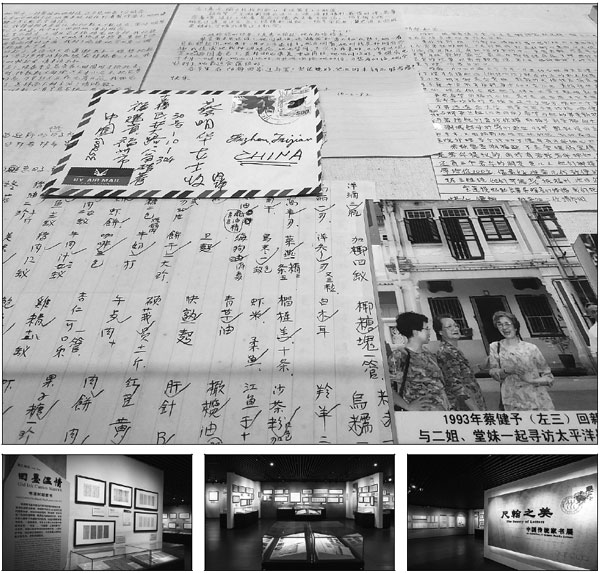Letter writers put pen to paper again
Lost art witnesses revival in digital age
Writing letters seems an old-fashioned way of communicating in today's digital world, but in China, efforts are being made to revive the waning practice.
With the widespread use of instant messaging, communicating by letter has fallen out of fashion.
When 14-year-old Wei Kangcheng wrote his first letter to his parents as part of his school homework in March, his difficult relationship with them improved.
|
From left: Fu Guoqing, headmaster of Fu Lei Middle School in Shanghai, reads letters from the students. Gao Erqiang / China Daily; a statue of translator Fu Lei at the school. Lu Lihong / For China Daily; Students write letters in class. Lu Lihong / For China Daily |
|
Letters are displayed at the Museum of Family Letters at Renmin University of China in Beijing. The museum has collected more than 1,000 handwritten letters donated by people worldwide. Photos Provided to China Daily |

For years, Wei had had arguments with his parents over his shyness. They urged him to communicate with other people more often, but Wei felt he had no trouble with social relationships.
"I expressed my innermost feelings in the letter, hoping my parents would accept my personality instead of pushing me into a corner, and that they would spend more time with me," he said.
Wei's parents discussed the situation with him after reading the letter.
"They said they would not encourage me to change my personality but would give me space to grow up in my own way. The letter has made it easier to close the gap between the two generations," Wei said.
At Fu Lei Middle School in Shanghai, where Wei and 1,456 other teenagers study, writing letters has been promoted for 10 years.
Named after the influential translator Fu Lei (1908-66), the school is located in Zhoupu town in the Pudong New Area. Fu was born in the town.
It holds classes relating to the translator's life, in which students read from his book Fu Lei's Family Letters, published in 1981, which features letters Fu and his wife wrote to their eldest son, Fu Cong.
Students are also taught to write to their parents, who send letters in reply.
Fu Guoqing, the school's headmaster, said, "The classes enlighten young minds about family relationships, and help to build strong, healthy families with efficient ways of communication."
Zhang Ding, deputy curator of the Museum of Family Letters at Renmin University of China in Beijing, said, "Putting pen to paper to write a letter has been an outdated means of communication since the 1990s."
According to a report released by the museum in 2015, only 7 percent of 1,220 respondents from more than 20 provinces, including Liaoning, Shandong and Jiangsu, said they still wrote physical letters to family members.
Some 70 percent of the interviewees did not keep any old family letters, with 32 percent discarding them when their families moved house. Some 26 percent were not in the habit of saving family letters, and 17 percent considered handwritten letters had "little value".
More efficient
Huang Xinhai, 19, from Hunan province, said she hardly writes anything by hand now.
"There is little room for handwriting in modern life, because communication is usually done by computer and mobile phone to reach others and to edit documents quickly," Huang said.
"Modern technology with fast speeds and clarity in communication is more efficient than traditional handwriting."
Jiang Xinhong, 26, from Liaoning, said: "I prefer instant messaging to convey important and urgent information, as most people usually carry smartphones, tablets or laptops. However, if you send a letter, you have to wait a long time for the reply."
Voicemail is also popular with Jiang. "I feel warm when I hear another person's voice. It seems as if they are sitting beside you," she added.
Despite the various advantages of digital communication, Jiang said she also has a good feeling when she receives handwritten letters.
"I love seeing an envelope popping through my letterbox, as I know the writer has taken time to prepare a letter for me, even if it's just to discuss everyday matters," she said.
The Museum of Family Letters at Renmin University has collected more than 1,000 handwritten letters donated by people worldwide. Most are from the public, but some have been written by well-known figures, including Chen Duxiu, one of the founders of the Communist Party of China.
Zhang, the curator, regards family letters with content relating to social affairs, astronomy, geography, politics and economics as valuable educational and historical material for the younger generation to embrace tradition and the key values of their ancestors.
He said educating children about letter writing involves far more than merely putting words on paper, as when they write, they learn to express themselves and to communicate with others.
"It's a skill that affects children's cognitive development. When they write, they build hand-eye coordination and practice fine motor skills," Zhang added.
Letter writing can be critically important for family relationships in helping to improve mutual understanding, especially between parents and children, according to Zhang.
His views were echoed by Cui Lijuan, a psychology professor at East China Normal University in Shanghai.
Cui said that in the past, most parental thoughts and views on a wide range of issues were "useful" and could be acted on repeatedly by children because society changed little from one year to the next.
But now, parents and children differ a lot, either in lifestyle or mindset, as many conventional parental views are challenged by children in an era of openness.
For teenagers broadening the number of people they meet, from just family members to friends, teachers and even strangers, parents are no longer their only sources of information, Cui said.
"Physiologically, the rapid development of the neural system in adolescence also results in emotional changes. Teenagers want both to rely on their parents and to break away from them, as they need more freedom."
As a result, Cui said writing a letter can help "everyone to calm down and think things over", as it is easy to voice negative views when feelings are running high.
But she said it is a process that involves pondering over every word that is used, and voicing heartfelt feelings to family members.
More understanding
Feng Jia, a Chinese-language teacher at Fu Lei Middle School, cited the example of a girl in her class.
She read a letter handed in voluntarily by the girl, who wrote that her parents had hit her for the first time during a quarrel over whether her hobby of drawing had affected the time and effort she devoted to her studies.
"The words she used in the letter were emotional and hurtful," said Feng, who did not intervene in the issue and respected what the child wanted to tell her parents.
A few days later, when Feng discussed the letter with the girl, the pupil said she had given her parents another letter, because after she had vented her anger in the first one, she realized it would upset them.
After they read the second letter, the parents were more understanding toward their daughter, Feng said.
"This is the magic of the handwritten letter. It can calm people down and help dispel some negative emotions, highlighting the essence of family bonds that are ignored by most people in everyday conversation," she said.
Efforts are being made in more areas of society to revive the tradition of writing letters, in an attempt to share thoughts, love and gratitude with family members.
Last year, civil engineering students at Changsha University in Hunan province wrote letters to their parents as part of an activity to encourage the practice.
Li Yang, a student at the university, told Xinhua News Agency: "We study in a city far from home and parents, so we focus more on ourselves. I'm thankful for this activity in which I can show gratitude to my parents."
In Shandong province, students studying information and control engineering at Yantai Automobile Engineering Professional College sent letters to their mothers on International Women's Day in March.
At the Chinese Parents' Conference in Beijing in December, Fu Guoqing, the Fu Lei Middle School head, launched an initiative for parents to write letters to their children attending primary and secondary schools.
The move was aimed at widening the influence of letter writing in family education.
Competitions to select the most impressive family letters collected from residents have been held in Fan county, Henan province; Hangzhou, capital of Zhejiang province; and Zigong, Sichuan province.
The education bureau in Fan county is editing a book of 25,000 shortlisted family letters selected from more than 100,000 collected up to April, and will stage an exhibition showcasing them across the nation.
Cui, the psychologist, said the revival of letter writing has seen it take precedence over postcards and greetings cards.
Li Siming, who works in Zhejiang, far from her home in Liaoning, said, "I exchange postcards with my best friends and family members at home on important occasions, such as graduation day anniversaries or birthdays, although we don't write long letters to each other.
"When you read the postcards and see their handwriting - either beautiful or just a scrawl - it touches your emotions," she added.
He Yiqing, 28, from Shanghai, said her parents have always sent her a card, along with illustrations or colorful stickers, on important occasions, such as her 18th birthday, the day she started work and on her wedding day, although regular communication between them is not done by letter.
"It's hard to find old digital messages on phones, as they may be accidentally deleted, whereas you can keep a card and look at it whenever you want," He said.
Cui said promoting traditional culture such as letter writing provides an effective communications option and encourages people to solve problems and remain calm when they are annoyed, and also to express love and build healthy relationships.
"These are the core reasons to revive letter writing, and there is no need to fixate on just one method of communication," she said.
But Cui said face-to-face communication is effective in most situations, because it can convey a person's tone, facial expression and eye contact, which instant messaging or letters cannot.
"So try to find the best way of communicating in different situations," she added.
caochen@chinadaily.com.cn
The long history of keeping in touch
Letter writing in China can be traced back thousands of years.
A pair of wooden boards were discovered by archaeologists in Yunmeng county, Hubei province, in 1975, on which two soldiers who served during the Qin Dynasty (221-206 BC) wrote to their parents in 223 BC, asking them to send money and clothes. They also inquired about the health of their family members.
Zhan Xiaobai, associate professor at the School of History at Beijing Normal University, said that before paper was invented, soldiers wrote on long, wide pieces of bamboo or wooden boards, sealed them and sent them by messengers on horseback.
Later, during the Han Dynasty (206 BC-AD 220), more people wrote letters to their families when paper-making technology improved.
The popularity of writing letters increased during the Tang Dynasty (618-907), when more people were taught to read and write.
A key turning point also came during that dynasty, when letter writing, which had been done in private, became an open literary style, Zhan said. Letters by influential writers were published, and the public could read them and learn the writers' thoughts.
(China Daily Global 06/06/2019 page1)




















